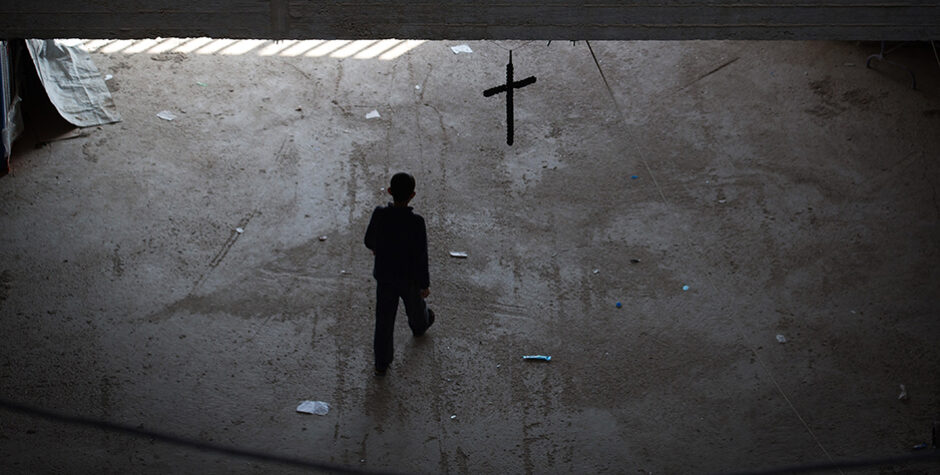ACLJ Submits Multiple Universal Periodic Reviews to U.N. Human Rights Council Highlighting Unspeakable Violence and Persecution Worldwide – As We Prepare Even Larger Submissions
Warning: The following blog includes some graphic discussion of violent atrocities. We believe it is necessary to understand the severity of the situation, however reader discretion is advised.
Across the globe, targeted harassment, violence, abduction, imprisonment, rape, and even death are becoming unimaginably commonplace – especially for Christians.
The ACLJ is taking direct action to fight Christian persecution, abuse, and human trafficking all around the world.
At the end of 2020, we went directly to the U.N. Human Rights Council (UNHRC) through our European affiliate, the European Centre for Law and Justice (ECLJ), to submit eight separate Universal Periodic Reviews (UPR) regarding violent persecution against Christians and the evil scourge of human trafficking.
We’ve told you how we’ve previously delivered multiple critical written submissions and oral interventions to the UNHRC urging immediate intervention to save Nigeria’s Christians who are being slaughtered at a record-setting pace by Islamic militias such as Boko Haram.
That deadly violence against Africa’s Christians doesn’t stop at Nigeria’s borders. Just as we warned, there have been reports of bloodshed and violence against Christians across Africa. The barbaric acts include beheadings, dismemberment, and sexual slavery.
Five of the eight UPRs we delivered to the UNHRC highlighted violence against innocent African Christians and other human rights abuses in Somalia, Niger, Mozambique, Namibia, and Sierra Leone.
In our report on Niger, the predominantly Muslim Central-African nation, we told the UNHRC how: “Muslim Fulani herdsmen from northwest Nigeria killed 12 Christians and kidnapped a couple from their church wedding ceremony taking place.”
As we pointed out in our UPR on Mozambique, Islamic violence against Christians is rapidly escalating:
As stated previously, Mozambique is experiencing a growing threat of Islamic extremism within its northern region. Since at least 2017, armed groups of suspected Islamist terrorists have continually attacked citizens in northern Mozambique. In these attacks, the terrorists have beheaded their victims and targeted women for kidnapping. While ISIS has claimed responsibility for some of these attacks, its true level of responsibility is not yet clear. However, these attacks are escalating at an alarming rate, with the first half of 2020 seeing “almost as many attacks by the jihadists . . . as in all of 2019”.
According to one recent report, Islamic terrorists with links to ISIS – which is scattered across the globe – beheaded and dismembered more than 50 innocent Christians with machetes in Mozambique during a mass execution on a soccer field.
Another common thread about the horrifying persecution against Christians across Africa is the threat against women and young girls of being kidnapped and sold into sexual slavery. Our reports highlighted these atrocities to the UNHRC.
Perhaps the worst offender of all is the West African nation of Sierra Leone, where monstrous sexual abuse and violent mutilation of young girls is allowed to continue with little government intervention.
As we stated in our UPR:
Sierra Leone’s Constitution calls for the government to protect the fundamental rights and freedoms of all people, and states that each person has the right to “life, liberty, security of person, the enjoyment of property, and the protection of law . . . .”
Our submission urged the U.N. to: “hold the nation’s government accountable for not adhering to its international treaty obligations, including the U.N. Convention on the Rights of the Child, Convention on the Elimination of All Forms of Discrimination against Women, and the Maputo Protocol.”
Violent persecution and human trafficking is not an evil limited to Africa. We submitted UPRs on the Eastern European countries of Estonia and Latvia as well for violations of human rights.
As our report points out, while it has protections against trafficking in place, Estonia – which interestingly enough identifies as 54% non-religious – is now “a destination country, meaning that people are being trafficked to Estonia from other countries.”
Our UPR stated:
[R]esources must be put into securing its borders and providing resources to police to better monitor the borders and be better equipped to identify and stop human trafficking before ever entering the country. This is essential in order to catch traffickers taking foreign victims into Estonia for use in forced labour and sexual exploitation.
In Latvia, which claims to be predominantly Christian, our UPR exposed how the poor are lured by traffickers with the promise of jobs, and then young women and girls are sold into prostitution.
As parents, as brothers and sisters, and simply as human beings, these atrocities should outrage each and every one of us. Defenseless Christians are being slaughtered by the thousands. Children are being sold into sexual slavery and abuse. And the greatest sin is that the leaders of these nations appear to be turning a blind eye. It should make your blood boil.
This is why the work of the ACLJ is crucial. We are redoubling our efforts to defend persecuted Christians worldwide, preparing to submit what may be the largest collection of written human rights and persecution submissions to the U.N. we’ve ever made. We’re planning to make dozens more country submissions in the year ahead. International leaders must be made aware of the heinous violence, abuse, and bloodshed and take swift action.
We have a moral obligation to defend our persecuted Christian brothers and sisters and to protect the women and children of the world from a living nightmare. The Bible commands us to:
“Defend the poor and fatherless: do justice to the afflicted and needy. Deliver the poor and needy: rid them out of the hand of the wicked.” (Psalm 82:3-4)
We are fighting for their lives. The work of the ACLJ is needed NOW MORE THAN EVER.

